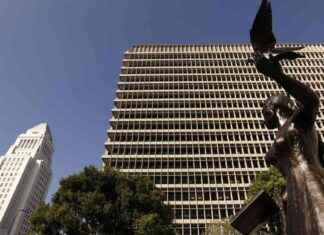Could this be the start of a more or less open conflict between the Nigerian authorities and Aliko Dangote, the most successful businessman on the continent? After the arrival of investigators from the anti-corruption agency at its Lagos headquarters last week, the Dangote group, controlled by the Nigerian billionaire, was publicly upset by an incident “intended to cause [him] unjustified embarrassment”. .
The conglomerate, active in cement, fertilizers, sugar, flour and soon hydrocarbons, was visited on Thursday, January 4, by the Economic and Financial Crimes Commission (EFCC) as part of a broader investigation targeting the former head of the Central Bank of Nigeria, Godwin Emefiele. In the sights of President Bola Tinubu, who came to power at the end of May 2023, Mr. Emefiele was suspended in June, then arrested and placed in detention.
Released on bail in December, the latter is accused of fraud and mismanagement. The central banker was the architect of a controversial exchange rate system, rationing the quantity of dollars available. Officially intended to maintain the stability of the naira, the national currency, this system is accused of having fueled corruption by allowing certain industrialists and well-connected personalities to obtain supplies of foreign currency at a very advantageous rate.
« Gestapo style invasion »
According to reports from the Financial Times, the Dangote Group is on a list of 52 companies requested by the EFCC to hand over documents relating to their foreign exchange allocations since 2014. But “no accusations of wrongdoing” have been brought against the company, underlines the press release published by the group over the weekend.
This also indicates that its representatives were precisely within the walls of the anti-corruption agency to hand over the requested documents when the search took place. “It should be noted that the officials did not take any documents or files from our head office during their visit, as these were already in their office,” the statement insisted.
In Lagos, some are wondering about the repercussions of a sequence which could augur tensions between the government and the richest man in Africa, whose fortune is estimated by Forbes at some 10.5 billion dollars (9 .6 billion euros). “The raid against the Dangote group is not only very suspicious, but above all likely to worsen the economic situation and scare off investors,” denounced Ikenga Ikeagwuonu, head of a commission on oil resources within the Nigerian Parliament.
In a sharply worded statement released on Tuesday, the Nigerian Employers’ Federation also denounced the “Gestapo-style invasion” of the Dangote group’s offices, saying in turn that it could harm the economy. “This news went around the world and many people, including potential investors, were caught off guard,” the Manufacturers Association of Nigeria said.
Shattering economy
The episode comes at a crucial moment for the captain of industry: his most emblematic project, a mega-refinery built on the outskirts of Lagos, is about to enter its operational phase. This colossal project worth nearly $20 billion (double the initial estimates) should allow Nigeria, Africa’s leading oil producer, to stop importing fuel. The refinery has already received several shipments of crude oil and could begin testing as early as this week.
Inaugurated in May in the presence of outgoing President Muhammadu Buhari but in the absence of his already elected successor Bola Tinubu, the complex appears to be the high point of the career of the billionaire whose activities are as flourishing as the Nigerian economy is faltering. However, in recent months, this achievement has made as much headlines in the Nigerian press as his quarrel with one of his rivals, Abdul Samad Rabiu, boss of the BUA group, Nigeria’s second largest cement producer. A competitor he accuses of having spread rumors about fraudulent foreign exchange transactions from which the Dangote empire would have benefited.
Are his troubles with the anti-corruption agency part of a political campaign against a boss previously known to be close to all successive Nigerian presidents? “This investigation does not resemble a witch hunt like Jack Ma [the Chinese businessman co-founder of the online commerce site Alibaba targeted by his country’s regulators], or like Milhail Khodorkovsky [the former CEO of the Russian oil group Yukos, imprisoned from 2003 to 2013]”, estimates economist specializing in emerging countries Charlie Robertson, saying he sees “no evidence that the government wants to oust Dangote”.
On the other hand, “it could be a signal to large companies that no one is above the law,” says this head of macroeconomic strategy at FIM Partners, an asset management company, “even if, for as far as I know, there was nothing illegal about the Central Bank of Nigeria offering cheap US dollars to Dangote’s group”.






